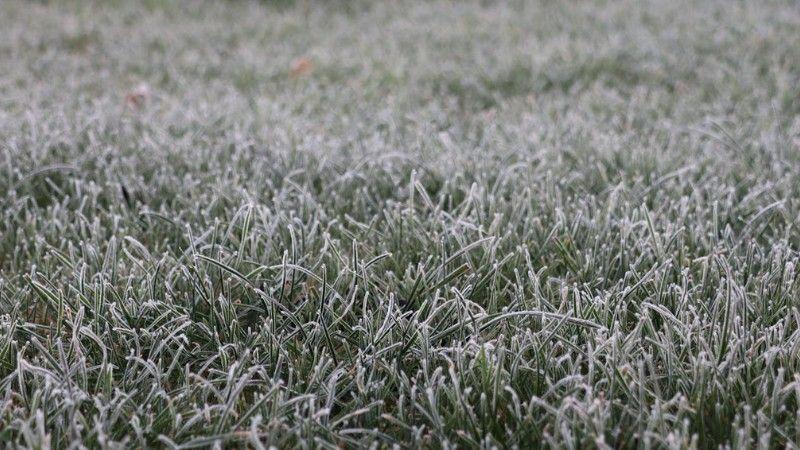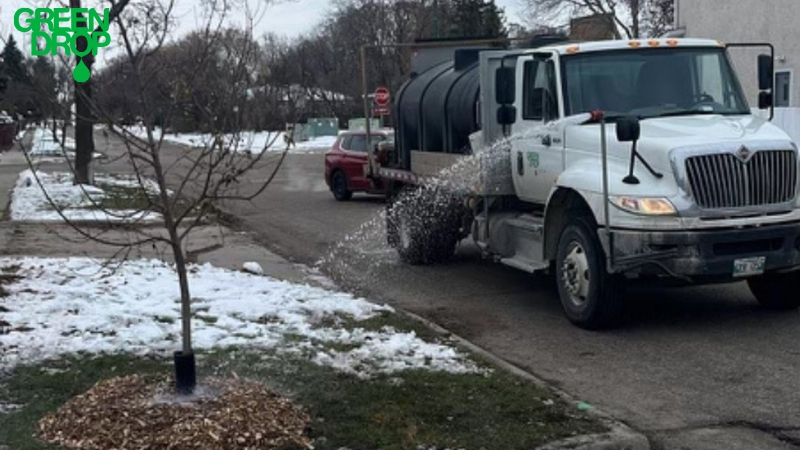Caring For Your Lawn in the Winter
Reading time: 5 minutesIt goes without saying that winter isn't exactly the time for lawn care.
Once the snow falls, your yard disappears under a blanket of white, and it feels like there’s nothing to do until April. And in some ways, that’s true; your lawn is dormant the entire winter.
That being said, there are certain things you can do during winter that can protect your grass from damage, prevent winter diseases, and set you up for a healthier recovery when spring finally arrives.

Here are the steps you should take during the winter months:
1. Stop mowing your lawn after the first frost
Mowing after the first snow or when temperatures are consistently below 0° exposes your lawn (which is no longer growing) to the harsh conditions.
While it's not a bad idea to cut your lawn a little shorter than normal in the fall, stop trimming it once the temperatures drop below freezing.
In Western Canada, cool-season grasses (like Kentucky bluegrass and fescue) do best when the final mow is around 2.5–3 inches. Too short increases winterkill risk, while too long creates matting and moisture problems under snow. If you’re unsure, err on the slightly taller side before winter.
Also, avoid the temptation to “clean up” the lawn mid-winter by mowing or trimming thawed patches. This damages frozen crowns and slows spring recovery.
2. Add a thin layer of mulch before it's too cold
Although too much thatch (dead leaves and branches) can be damaging to your lawn, especially in the fall, a thin layer of mulch can protect your grass roots from snow, frost, and inclement weather. It can also prevent deeper layers of your soil from freezing altogether, making it easier for your lawn to return in the spring.
The ideal winter mulch is finely shredded leaves or compost. The last thing you want is thick, wet clumps of whole leaves. Aim for a layer no thicker than ½ inch. Anything heavier traps moisture and creates the perfect environment for snow mould.
If you didn’t clean up leaves before snowfall, try to remove or mulch pockets of wet, matted leaves during early thaws BEFORE snow covers them for good. This reduces the risk of fungus and improves airflow once the snow returns.
3. Try to stay off a snowy lawn
Too much walking on a lawn covered with snow or ice can be damaging, since the grass beneath is more brittle when frozen. If it's at all possible, try to direct foot traffic along a path that goes around your lawn rather than over it.
Heavy snow piles from shovelled walkways have the same effect. Try to avoid piling snow on the lawn, especially near driveways or sidewalks.
Also, avoid parking vehicles or leaving heavy items on frozen turf. Even short-term weight can crush grass crowns beneath the ice.
4. Watch for snow mould and freeze–thaw damage

Snow mould appears in early spring as grey or pink patches, caused by moisture trapped under long-lasting snow or ice. Areas with thick snow piles or last fall’s un-raked leaves are most vulnerable. While you can’t treat it in winter, minimising compaction and keeping your lawn clean before snowfall makes a huge difference.
Grey snow mould thrives under extended snow cover, while the more aggressive pink snow mould can survive even without snow if conditions stay wet and cool. Both weaken grass blades and crowns, slowing green-up in spring. The best prevention is reducing anything that traps moisture.
Freeze–thaw cycles (common in Western Canada) can cause turf “heaving,” where roots are pushed upward. Staying off the lawn and minimizing foot traffic is the best defence.
Heaving is most common in exposed or thin turf areas, where soil repeatedly expands and contracts. Once grass crowns lift above the soil line, they dry out quickly and may not re-root in spring. Keeping snow piles small and avoiding compaction helps insulate the soil evenly, reducing heave risk.
5. Make sure water isn't building up in the winter months
Although it may be easier to recognize that snow and ice can be damaging to your lawn, the water they leave behind can pose problems as well. Poor drainage doesn't just allow topsoil to rinse away; it also clears the way for fungus, insects, and other pests that can be damaging to your lawn's growth when spring comes.
A couple of simple tips to keep in mind:
- Shovel or plough snow piles away from your lawn to prevent the formation of ice layers.
- Break up that ice! Ice can inhibit water absorption and create drainage issues when it melts. So break up large accumulations of ice and move it to where it can melt properly, without causing issues to your lawn.
- Clear pathways for meltwater and ensure downspouts discharge away from lawn edges. When meltwater has nowhere to go (typical during a spring thaw over frozen soil), it pools and smothers turfgrass roots.
- If long ridges of ploughed snow form along the edges of your lawn, break them up when it's safe to do so. These berms cause some of the worst snow-mould and drainage issues.
6. Look out for weeds
When it isn't snowing, try to take a quick look through your lawn to see if any weeds have taken root and pull them if necessary. Some types of weeds are sturdier than grass and can take advantage of the colder weather to grow and spread, so removing them early on is a good way to protect your lawn in advance of warmer weather.
Winter annual weeds can sprout during warm mid-winter thaws. Removing them early prevents them from overshadowing young spring grass. Some common winter weeds you should watch for:
- Chickweed: Thrives in cool, damp mid-winter conditions and spreads quickly along the soil surface.
- Henbit: A hardy winter annual with purple blooms in early spring if left unattended.
- Shepherd’s purse: Often germinates during winter warm spells and grows rapidly once temperatures rise.
- Annual bluegrass (Poa annua): A winter-loving grass weed that sneaks into thinning turf and produces seed heads early in spring.
- Creeping buttercup: Evergreen even under snow in mild winters, taking advantage of soggy soil.
- Dandelion rosettes: While dandelions aren’t true winter annuals, young rosettes can form and strengthen beneath the snowpack.
- Common mallow: A low-growing weed that tolerates cold soil and spreads in thinning patches.
7. Keep your lawn equipment and supplies out of the cold
Obviously, you don't want things like lawnmowers and gasoline containers to be left out in winter conditions, but it's also important to properly store things like fertilizer and grass seed. Because these are organic elements, freezing them isn't a good idea. Keep them in a dry, safe place until they're ready to be used again.
Store grass seed off concrete floors and away from exterior walls. Fluctuating temperatures can ruin germination rates. Fertilizer should stay sealed to prevent moisture clumping. And always drain your hoses. Burst hoses are a spring nuisance nobody enjoys.
8. Protect now, plan for Spring
You don't have to do much to care for your lawn in the winter, but following these simple steps can make it easier to enjoy a healthy, green lawn once spring returns.
While you can’t actively “fix” a lawn during winter, this is the perfect season to take stock. Make note of drainage issues, recurring ice patches, or areas where snow tends to pile up. These patterns help guide spring corrections.
Early spring (around March–April) is the time to schedule aeration, overseeding, and fertilizer plans. Booking these services early ensures you’re first in line once conditions allow.
Winter safety tips for homeowners
When checking on your lawn or handling snow around the yard, winter safety matters just as much as turf health.
- Wear proper traction footwear to avoid slipping on hidden ice, and use caution when breaking up ice layers to avoid damaging frozen turf crowns.
- Avoid using rock salt on lawn edges. It burns grass and creates spring bare spots.
- Never store vehicles, snowblowers, or heavy containers on frozen grass, as the weight can crush dormant turf.
- Be mindful when shovelling near the lawn. Metal shovels can scrape and tear frozen turf if you catch the edge, leaving scars that take months to fill in come spring.
Need help protecting your lawn this winter?

Our GreenKeepers are experts in lawn health, from preparing your yard for winter to managing snow and ice so your turf doesn’t suffer beneath it.
To give your lawn the best chances come spring, don't forget about a pre-spring lawn assessment or sign up for our seasonal services. Winter is a pause, not a full stop. And the right protection now pays off when the snow melts.

